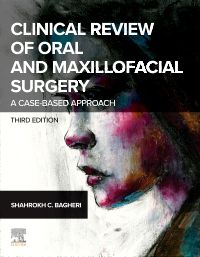Clinical Review of Oral and Maxillofacial Surgery - E-Book, 3rd Edition
Organized around real patient scenarios, Clinical Review of Oral and Maxillofacial Surgery, 3rd Edition, covers all the material you need to know for the board, in-service, and certification exams, while also preparing you to handle common patient situations in professional practice. More than 110 teaching cases are brought to life with an overview of the most common clinical presentations, physical examination findings, diagnostic tools, complications, treatments, and discussions of possible issues. This text covers the full scope of modern oral and maxillofacial surgery, while helping you focus on the conditions and disorders which are the most common or have significant implications for modern clinical practice. Coverage represents the full scope of modern oral and maxillofacial surgery, while helping you focus on the conditions and disorders which are the most common or have significant implications for modern clinical practice.
ISBN :
9780443110825
Publication Date :
01-10-2024
Organized around real patient scenarios, Clinical Review of Oral and Maxillofacial Surgery, 3rd Edition, covers all the material you need to know for the board, in-service, and certification exams, while also preparing you to handle common patient situations in professional practice. More than 110 teaching cases are brought to life with an overview of the most common clinical presentations, physical examination findings, diagnostic tools, complications, treatments, and discussions of possible issues. This text covers the full scope of modern oral and maxillofacial surgery, while helping you focus on the conditions and disorders which are the most common or have significant implications for modern clinical practice. Coverage represents the full scope of modern oral and maxillofacial surgery, while helping you focus on the conditions and disorders which are the most common or have significant implications for modern clinical practice.
Key Features
- NEW! 12 chapters new to this edition cover topics that include implantology, radiology, pharmacology, anesthesia, medicine, and cosmetic and reconstructive surgery.
- NEW! Section topics and cases address Covid and other infectious diseases, digital dentistry, expanded content on cosmetic surgery, practice management, and more.
- NEW! Expanded art program includes 260 new color clinical photos and illustrations between the print and eBook (included with print purchase), aimed at enhancing understanding of key concepts.
- UPDATED! All chapters feature updated reference and additional content.
- NEW! eBook version, included with print purchase, provides access to all the text, figures, and references — plus practice questions and sample exams — with the ability to search, customize content, make notes and highlights, and have content read aloud.
- NEW! Mix of up-and-coming and experienced authors and editors brings invaluable clinical expertise and fresh, modern perspectives to the text.
- NEW! Additional comprehensive appendices, available on the eBook (included with print purchase), features a section with tips for passing the oral examination.
- Case-based approach and format reflects the move towards case-based learning in dental education and emphasizes the value of learning through real patient scenarios.
- Logical and consistent chapter format includes an overview of the most common clinical presentations, physical examination findings, diagnostic tools, complications, treatments, and discussions of possible complications.
- Detailed figures and illustrations support key concepts throughout the text.
- Broad-reaching content is perfect for all levels of study or practice, including residents and pre-doctoral students in the clinical setting, dental students, those preparing for board and/or training and recertification, as well as seasoned clinicians looking to stay up to date on the latest trends in clinical practice.
Author Information
Edited by Shahrokh C. Bagheri, BS, DMD, MD, FACS, FICD, Private Practice, Georgia Oral and Facial Reconstructive Surgery, All On Smile, and Eastern Surgical Associates and Consultants; Director of Fellowship in advanced Oral and Maxillofacial Surgery and Attending Oral and Maxillofacial Surgeon and immediate past Chief of Division, Northside Hospital, Atlanta, Georgia, USA


